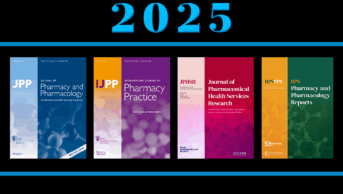We currently live in a period of endemic misinformation and outright disinformation, where social media echo chambers increasingly reinforce scepticism in science and evidence-based decision making. A lack of transparency surrounding the procurement, pricing, profits, marketing, distribution and prescription of medicines can erode public trust in health systems.
The latest themed collection in the Journal of Pharmaceutical Health Services Research (JPHSR) — ‘Transparency and accountability in pharmaceutical and health systems’ — collates current research in this area, aimed at fostering the development of policies that would create robust, equitable and trusted pharmaceutical health systems, for better population health outcomes for all.
Transparency and accountability enables the public to trust decisions of healthcare organisations, even if they do not agree with the decision itself
Public mistrust in pharmaceutical and health supply systems can lead to vaccine hesitancy, the adoption of untested remedies, stockpiling of medication and disregard of public health advisories or screening recommendations, as was observed at several stages of the COVID-19 pandemic. Transparency and accountability enables the public to trust decisions of healthcare organisations, even if they do not agree with the decision itself, since they understand the rationale and evidence the decisions are based upon1.
As summarised by Jillian Kohler, editor-in-chief of the JPHSR: “The complexities of the pharmaceutical system require tailored governance approaches to identify risks to waste, corruption, mismanagement and fraud. If risks are not addressed, population access to medicines, particularly for the most vulnerable groups, can be negatively affected.
“Transparency and accountability are two key principles of good governance that can contribute to more effective and fair pharmaceutical systems that benefit the general population. This collection aims to advance policy and discussion on these critical issues.”
The collection is guest edited by Alison Thomson, a healthcare ethics expert and associate professor at the University of Toronto, whose own research investigates the various ethical issues of public health, bridging the scientific community, governments and the public. Thomson has worked extensively to explore public perceptions and trust of health organisations, as well as the resulting implications to public health. In her editorial introducing the themed collection, she points out that the “epistemic corruption of the scientific literature can only be fixed with transparency about who funds, designs and authors studies, and who takes money from industry and for what purpose”.1
The following papers from the collection cover a range of topics, including the role of undisclosed conflicts of interest, influences over government health policy, misinformation, corruption and misleading drug marketing.
Consequences of medical misinformation in the public domain
This scoping review, conducted by researchers at the University of Toronto, Canada and the University of Auckland, New Zealand, discovered that low-quality advertisements on social media by ‘celebrities’ and patient influencers sponsored by pharmaceutical companies may disseminate misleading information to the public. Although such unrestricted direct-to-consumer advertising of prescription drugs is only legal in the United States and New Zealand, social media amplifies the reach of such advertising across national borders.
This research has already influenced US Food and Drug Administration policy and was cited in a press release published on 9 September 2025, which announced a crackdown on deceptive drug advertising.
Sensationalist reporting during the COVID-19 pandemic has contributed to a decline in the credibility of health media. This commentary — by Nathalie Sonnac, professor of information and communication sciences at the University of Paris Panthéon-Assas, and David M Smadja, professor of haematology at Paris Cité University and Georges Pompidou European Hospital, France — proposes strategies to counter medical misinformation and disinformation through improving public scientific literacy, identifying trusted sources of information and regulating the health media.
Corruption undermines the healthcare workforce
This review — written by Daniela Cepeda Cuadrado, senior programme adviser at U4 Anti Corruption Resource Center, Chr. Michelsen Institute, Norway — has identified the ways that corruption and fraud can impact healthcare workers during service delivery, financing (procurement, financial mismanagement, profit-driven healthcare) and human resourcing (recruitment, assignment, transfer and promotion), as well as outlines the key policy initiatives required to protect the workforce. Healthcare workers being victims of corruption can result in “higher attrition levels, more systemic corruption and a more entrenched culture of impunity”.
This editorial by Andrew Bowra and team at the University of Toronto argues that in order to devise effective and equitable anti-corruption measures in formerly colonised countries, the historical, societal, structural and cultural contexts surrounding corruption in the health sector must be considered. Instead of applying broad prescriptive tools, effective counter measures must be tailored to acknowledge the role of colonial and neocolonial legacies in shaping corrupt behaviours.
Conflicts of interests of pharmaceutical regulatory bodies
This research study by Joel Lexchin, professor emeritus at York University, Canada, uncovered that the receipt of application fees from pharmaceutical companies to conduct health technology assessments of their drugs creates a conflict of interest that may have changed the recommendations of the Canadian Agency for Drugs and Technologies in Health (now Canada’s Drug Agency) as to whether prescriptions of non-oncology drugs should be funded with public money.
The increasing importance of transparency is evident in the NHS ten-year health plan for England, published in July 2025, which has committed that “improvements in care will be driven less by top-down regulation and more by bottom-up transparency, with performance more open to public scrutiny and patient input than ever before”.
This JPHSR-themed collection has highlighted various ethical and transparency concerns to be addressed in the international pharmaceutical sector in order to increase trust in public healthcare systems and improve patient and public health outcomes.
Have you undertaken research related to the transparency and accountability of pharmaceutical health systems?
If so, please submit your work to the Journal of Pharmaceutical Health Services Research and email us to let us know at: jphsr@rpharms.com
If accepted, we will retrospectively add your work to this themed collection.
- 1.Thompson A. Trust, transparency, and accountability in health and pharmaceutical systems. Journal of Pharmaceutical Health Services Research. 2024;16(1). doi:10.1093/jphsr/rmaf003


